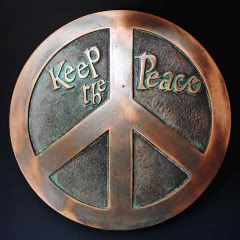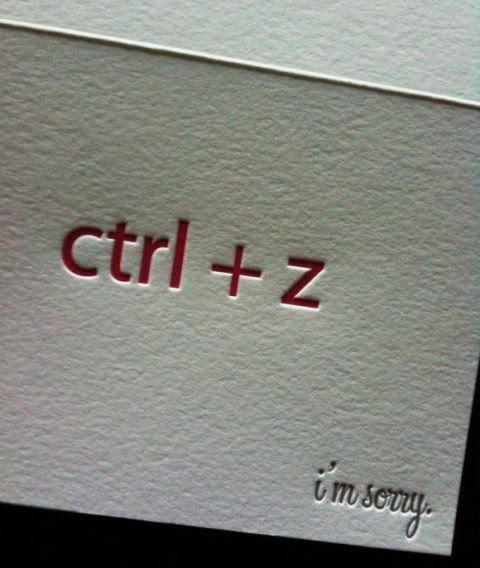The Importance of Saying "I'm Sorry"
There is an expression that we use when we make a mistake: “I'm only human.” We're saying that everybody makes mistakes, so what we did is okay. And it is okay, as long as we take personal responsibility for our wrongdoing. Saying “sorry” but not meaning it or not intending to improve our actions will cause a lack of trust to develop. Saying “I'm sorry” and admitting that we did something wrong is the first step to self-improvement.
But I'm Always Right!
Nobody is always right. Nevertheless, it's hard for most of us to admit when we're wrong. Sometimes we know that we did something we shouldn't have, and we feel badly about it. So the mind plays a trick on us. It pretends that we didn't do anything wrong. Then we don't have to feel badly about it, and we don't have to say, “I'm sorry,” because saying “I'm sorry” would mean admitting that we behaved badly.
This logic will make you feel distant. There is nothing wrong with making a mistake. But there is something wrong about not admitting it.
But I'm Always Right!
Nobody is always right. Nevertheless, it's hard for most of us to admit when we're wrong. Sometimes we know that we did something we shouldn't have, and we feel badly about it. So the mind plays a trick on us. It pretends that we didn't do anything wrong. Then we don't have to feel badly about it, and we don't have to say, “I'm sorry,” because saying “I'm sorry” would mean admitting that we behaved badly.
This logic will make you feel distant. There is nothing wrong with making a mistake. But there is something wrong about not admitting it.
When I was younger and also well into my adult life, I found it difficult to say I'm sorry. It wasn't that I didn't want to say it. I just could not bring myself to say it. In fact, most often, I truly truly wanted to relieve myself of the guilt that can overwhelm us when we know an apology is in order. Yet, I found the humbling experience required a bit of courage and it was that I lacked. Little did I understand that not taking that step to cleanse myself of any wrongdoing caused much more internal anguish than a simple apology could ever cause.
Today, I have grown and understand the importance of keeping ourselves pure in thought and deed. My peace remains on hold until I muster that courage to admit the exact nature of my wrongs. I also understand that in saying I am sorry I am not always apologizing for my point of view but more often than not, it is about how I might have projected that point of view, in words or actions. I can apologize for my manner of speech without forfeiting my stance. That is so freeing.
I am deeply saddened for those who , so to speak, "know not what they do".
Yes, sometimes I am injured by actions or words but more than that I feel their pain that I know comes from the inability to say I'm sorry. It's a beast of a burden, and one that is carried unnecessarily. Humans have a conscience and one may never admit it, but somewhere inside a person is bothered when they act or speak wrongly. Saying I'm sorry has a way of dissipating walls that otherwise will remain forever and deliver an internal twinge when faced with the person we have wronged, even many years down the road.
I think it very common that many experience this inability to say I'm sorry. I am not speaking of the type of "I'm sorry" required when you bump into the lady in the grocery line. I'm speaking of situations in which your speech or actions has injured another. What do you think happens when we keep these things within us time and time again versus relieving our conscience? Years worth of shame and guilt heavily effect who we feel we are....our true core being is unable to shine forth. It's not an easy task in the beginning because it has not been our natural way of doing things. Making that first effort will enlighten ourselves to a new way of behaving.
One I like very much now.
Believe it or not, I am still wrong occasionally. I still speak or act inappropriately at times. But today, I can make amends for my actions, let it go, and maintain my own personal integrity.
Do you apologize?
It takes courage to grow up
and become who you really are.
e.e. cummings
and become who you really are.
e.e. cummings
A proper apology should always include the following:
a detailed account of the situation
acknowledgment of the hurt or damage done
taking responsibility for the situation
recognition of your role in the event
a statement of regret
asking for forgiveness
a promise that it won't happen again
a form of restitution whenever possible

peacegirlplace
2010
a detailed account of the situation
acknowledgment of the hurt or damage done
taking responsibility for the situation
recognition of your role in the event
a statement of regret
asking for forgiveness
a promise that it won't happen again
a form of restitution whenever possible

peacegirlplace
2010

4 comments:
Oh sure, make me feel guilty. Harrumph. ;)
I'm sorry...hehee!! See, it's easy :))
Actually, it's a repost. Trying to move my blogs from the space, which doesn't work too well seeing as I can't get back in time to them...grrr.
I was raised in a family that NEVER apologizes, so this has been a tough topic for me! Nonetheless, knowing how much it hurts not to receive an apology from family has made me determined to be able to apologize to my family - my husband and kids. It has to start somewhere. Last year I went through a very difficult time with my son and I most certainly did not feel responsible to apologize as it was HIS immature, angry decisions that caused the problems. (Right?!) Our relationship continued to deteriorate. Finally, I accepted that my role as a parent required me to teach him forgiveness and the only way to really do that was to take responsibility for my own role in the issue and apologize.
It was difficult, but I did it, and it felt wonderful! I know it meant the world to him as well. Our relationship is now better than it has been in many years, and I'm watching him mature more than ever before. I never would have thought that saying I'm sorry could be one of my most important lessons as a parent. Now, to get better at it outside my immediate family...
;)
That's beautiful, Rebecca. I've found myself in similar circumstances with my teenage daughter. Owning my part is all I am responsible for and I do it with the same hopes....that she see in me the same I wish for her. I often apologize for my delivery of words and not the actual meaning behind them. Because we have to remember, as parents, that we do not know all. Often we are in a situation which we have never encountered before and we do fail at handling it properly.
It takes some time and thought to separate our part from anothers. But as with all things, there are two sides and we do play a part. I've found that things do smooth themselves out much nicer when I take that hard step and apologize.
I'm glad you shared that and can validate the good it does to apologize. It almost feels as though it gives us back some kind of power over ourselves. The more we feel these results, I think the easier it becomes.
Post a Comment